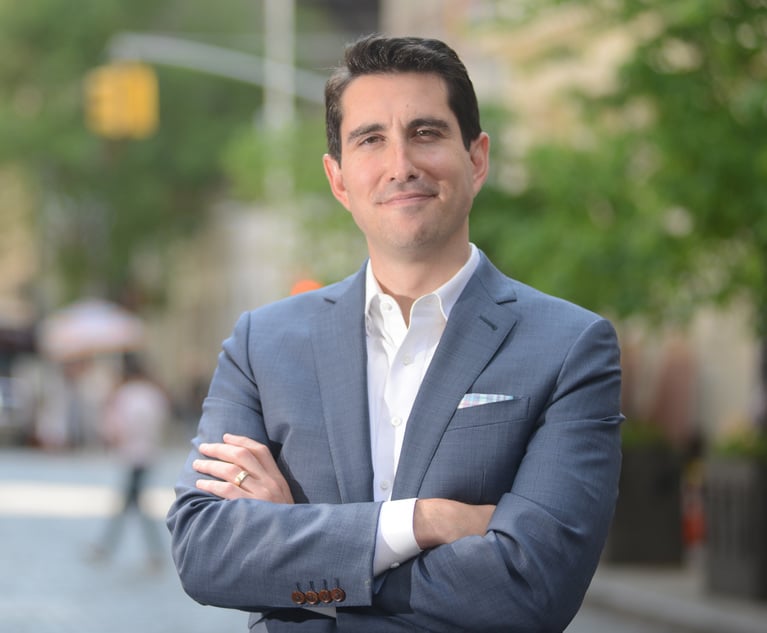Little Pills Cause Big Headaches for Employers
Opioid use has reached epidemic proportions. States are decriminalizing marijuana use. How much are employers spending because of alcohol misuse, illicit drug use, misuse of medications and substance use disorders?
October 04, 2017 at 01:55 PM
7 minute read

Opioid use has reached epidemic proportions. States are decriminalizing marijuana use. How much are employers spending because of alcohol misuse, illicit drug use, misuse of medications and substance use disorders? “Facing Addiction in America: The Surgeon General's Report on Alcohol, Drugs, and Health,” estimates that drug and alcohol misuse costs the United States more than $400 billion each year in lost workplace productivity (in part, due to premature mortality), health care expenses, law enforcement, other criminal justice costs, and losses from motor vehicle crashes. Employees with drug or alcohol problems are more likely to miss work, have diminished productivity when they are at work, be involved in accidents and disrupt other workers. What's an employer to do?
Drug-Free Workplace Policies
Policies establishing the employer's stance against workplace drug and alcohol abuse are key to being able to take effective action. Drug testing implicates the employees' rights of privacy. See, e.g., Skinner v. Railway Labor Executives, 489 U.S. 602 (1989) and Wilkinson v. Times Mirror Corp., 215 Cal. App. 3d 1034 (1989). Determining whether a particular act invades a person's privacy involves balancing the individual's reasonable expectation of privacy against the legitimate business and safety concerns of the employer. Employers can minimize the employee's and applicant's reasonable expectations of privacy by announcing that the employer will require drug tests.
In crafting the policy, employers should understand the requirements and restrictions governing their workplace and jurisdiction. For example, the Department of Transportation and Federal Motor Carrier Safety Administration require drug and alcohol testing for certain commercial vehicle owners, operators, and their drivers. In Massachusetts, employers may not fire employees for use of medical marijuana. Barbuto v. Advantage Sales And Marketing, Mass., (July 17, 2017). In contrast, the California Supreme Court recognized that, while California had legalized medical marijuana, its use was still prohibited under federal law and employers did not have to permit medical marijuana use by employees, as in Ross v. RagingWire Telecommunications, 42 Cal. 4th 920, 926 (2008).
The Drug-Free Workplace Act of 1988, 41 USC Sections 8101 through 8106, establishes standards for employers who have contracts with the federal government. This act requires, among other things, that: the employer notify employees that the possession and use of drugs in the workplace is prohibited; the employer notify employees that it will impose sanctions for violating the policy; and, the employer actually impose sanctions, up to and including termination of the employee, for violations. In addition, the employer is required to establish a drug-free awareness program, which includes information about the dangers of drug use and any available drug counseling programs.
Employers who do not contract with the federal government may have less complex policies, but they should still have a clear statement against drug use, reserving their right to conduct drug testing, and promising consequences for use of drugs or alcohol in the workplace.
Pre-Employment Drug Testing
Some employers routinely require job applicants to undergo drug testing before starting work. The Society for Human Resources Management reports that the number of employers conducting pre-employment drug testing has fallen in recent years, possibly because of increased competition for workers.
While courts have typically allowed pre-employment drug screening, there are some potential pitfalls if the screening is not conducted appropriately. The employer should obtain the applicant's written consent to the drug testing, including the specific procedure to be used. The request for consent may cause applicants to withdraw their applications. Some commentators attribute this to knowing that the applicant is likely to fail, while others believe the applicant does not wish to work for an employer that is concerned with the employee's activities during non-work hours.
Ideally, drug screening should be conducted after the employer has made a conditional offer of employment. The Equal Employment Opportunity Commission Enforcement Guidance: Disability-Related Inquiries And Medical Examinations Of Employees Under The Americans With Disabilities Act (ADA) explains that tests to determine the current illegal use of drugs is not a prohibited medical examination, but blood, urine, and breath analyses to check for alcohol use is a medical examination that can be conducted only after a conditional offer of employment. A positive test for opiates may be the result of either lawful or unlawful use of prescription opiates. Marijuana use can result in positive test results for several days, or even weeks, after the marijuana use.
When the individual is an existing employee, hired into another position, the ability to test varies depending upon the jurisdiction. The Equal Employment Opportunity Commission allows post-offer drug testing when the employer tests all employees entering the same job category. In California, however, courts have recognized that the employer's need to conduct drug screening is reduced for current employees, because the employer has had the opportunity to observe the employee in the workplace. As a result, testing for a promotion or job transfer may violate the employee's rights of privacy. See, Loder v. City of Glendale, 14 Cal. 4th 846 (1997).
Drug Testing During Employment
A wide variety of options exists for conducting drug tests of current employees. Again, the employer must understand the regulations that apply to its particular industry and in its jurisdiction. Only a limited number of employers may conduct random drug tests. Employers often elect to conduct post-accident tests, either after every accident or after accidents involving personal injury or significant property damage. One safe approach is to require testing when the employer has a reasonable suspicion, based upon objective observations, that the employee is impaired. Another approach is to require the employee to visit a medical professional, for a determination of whether the employee is safe to continue working and ask the medical professional to determine if drug testing is appropriate.
In 2016, the Occupational Safety and Health Administration (OSHA) promulgated regulations governing drug tests of current employees. OSHA expressed concern that employers were deterring employees from reporting illness or injuries by requiring or threatening drug testing as a form of retaliation. The rule does not prohibit drug testing of employees. It only prohibits employers from using drug testing, or the threat of drug testing, as a form of retaliation against employees who report injuries or illnesses. If an employer conducts drug testing to comply with the requirements of a state or federal law or regulation, the employer's motive would not be retaliatory and this rule would not prohibit such testing. Significantly, the new regulations permit drug testing of employees who report work-related injuries or illnesses so long as the employer has an objectively reasonable basis for testing.
Rehabilitation Support
Employers are turning to creative solutions, in an effort to preserve the employment relationship with a trained, qualified worker. Employee Assistance Programs can provide free, confidential counseling for workers, helping them to identify other resources and tools. Use of sick leave or unpaid time off for employees to participate in a voluntary rehabilitation may be required by law or provided voluntarily by the employer. Last chance agreements are a carrot and stick approach, disciplining the employee for violation of the anti-drug policy, while allowing her to remain employed so long as she abstains from the use of alcohol or illegal substances.
Employers have tools to prevent lost productivity due to drug and alcohol abuse. To understand those tools fully, the business should consult with an attorney who understands the laws and regulations applicable to both the jurisdiction and the industry. Adopting a detailed plan of action before there is a need for it can prevent drug-induced headaches.
Margaret Grover is a partner with Oakland, California-based Wendel, Rosen, Black & Dean. She has been practicing employment law for 30 years and can be reached at [email protected].
This content has been archived. It is available through our partners, LexisNexis® and Bloomberg Law.
To view this content, please continue to their sites.
Not a Lexis Subscriber?
Subscribe Now
Not a Bloomberg Law Subscriber?
Subscribe Now
NOT FOR REPRINT
© 2025 ALM Global, LLC, All Rights Reserved. Request academic re-use from www.copyright.com. All other uses, submit a request to [email protected]. For more information visit Asset & Logo Licensing.
You Might Like
View All
Kraken’s Chief Legal Officer Exits, Eyes Role in Trump Administration
3 minute read

Collectible Maker Funko Wins Motion to Dismiss Securities Class Action

How Tony West Used Transparency to Reform Uber's Toxic Culture
Trending Stories
- 1Justice Department Sues to Block $14 Billion Juniper Buyout by Hewlett Packard Enterprise
- 2A Texas Lawyer Just Rose to the Trump Administration
- 3Hogan Lovells Hires White & Case Corporate and Finance Team in Italy
- 4New York District Attorneys Endorse Governor's Proposed Rollback of Discovery Reforms
- 5Greenberg Traurig Launches Munich Office with Eight Hires, Including McDermott Group
Who Got The Work
J. Brugh Lower of Gibbons has entered an appearance for industrial equipment supplier Devco Corporation in a pending trademark infringement lawsuit. The suit, accusing the defendant of selling knock-off Graco products, was filed Dec. 18 in New Jersey District Court by Rivkin Radler on behalf of Graco Inc. and Graco Minnesota. The case, assigned to U.S. District Judge Zahid N. Quraishi, is 3:24-cv-11294, Graco Inc. et al v. Devco Corporation.
Who Got The Work
Rebecca Maller-Stein and Kent A. Yalowitz of Arnold & Porter Kaye Scholer have entered their appearances for Hanaco Venture Capital and its executives, Lior Prosor and David Frankel, in a pending securities lawsuit. The action, filed on Dec. 24 in New York Southern District Court by Zell, Aron & Co. on behalf of Goldeneye Advisors, accuses the defendants of negligently and fraudulently managing the plaintiff's $1 million investment. The case, assigned to U.S. District Judge Vernon S. Broderick, is 1:24-cv-09918, Goldeneye Advisors, LLC v. Hanaco Venture Capital, Ltd. et al.
Who Got The Work
Attorneys from A&O Shearman has stepped in as defense counsel for Toronto-Dominion Bank and other defendants in a pending securities class action. The suit, filed Dec. 11 in New York Southern District Court by Bleichmar Fonti & Auld, accuses the defendants of concealing the bank's 'pervasive' deficiencies in regards to its compliance with the Bank Secrecy Act and the quality of its anti-money laundering controls. The case, assigned to U.S. District Judge Arun Subramanian, is 1:24-cv-09445, Gonzalez v. The Toronto-Dominion Bank et al.
Who Got The Work
Crown Castle International, a Pennsylvania company providing shared communications infrastructure, has turned to Luke D. Wolf of Gordon Rees Scully Mansukhani to fend off a pending breach-of-contract lawsuit. The court action, filed Nov. 25 in Michigan Eastern District Court by Hooper Hathaway PC on behalf of The Town Residences LLC, accuses Crown Castle of failing to transfer approximately $30,000 in utility payments from T-Mobile in breach of a roof-top lease and assignment agreement. The case, assigned to U.S. District Judge Susan K. Declercq, is 2:24-cv-13131, The Town Residences LLC v. T-Mobile US, Inc. et al.
Who Got The Work
Wilfred P. Coronato and Daniel M. Schwartz of McCarter & English have stepped in as defense counsel to Electrolux Home Products Inc. in a pending product liability lawsuit. The court action, filed Nov. 26 in New York Eastern District Court by Poulos Lopiccolo PC and Nagel Rice LLP on behalf of David Stern, alleges that the defendant's refrigerators’ drawers and shelving repeatedly break and fall apart within months after purchase. The case, assigned to U.S. District Judge Joan M. Azrack, is 2:24-cv-08204, Stern v. Electrolux Home Products, Inc.
Featured Firms
Law Offices of Gary Martin Hays & Associates, P.C.
(470) 294-1674
Law Offices of Mark E. Salomone
(857) 444-6468
Smith & Hassler
(713) 739-1250






